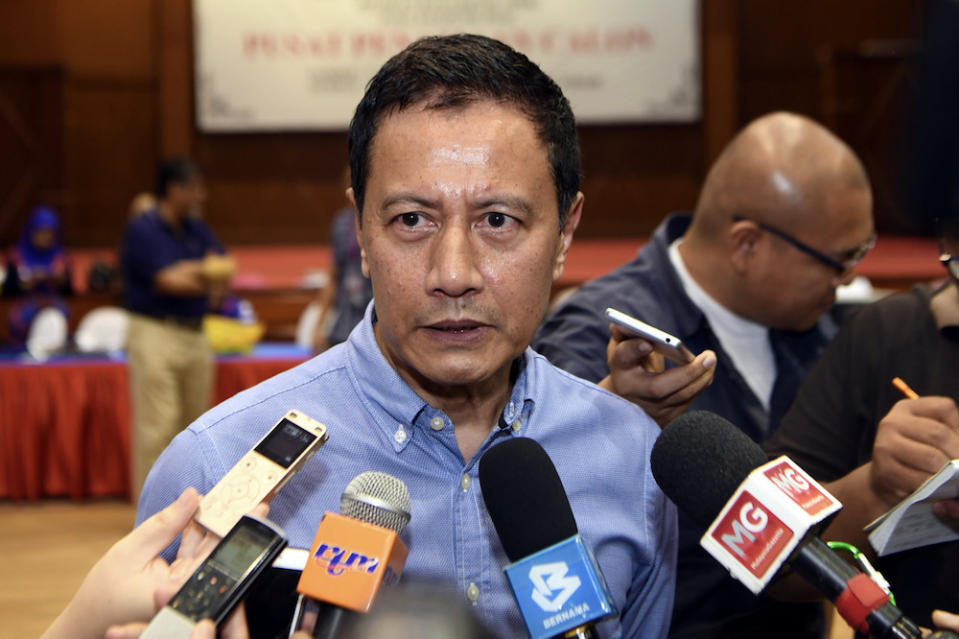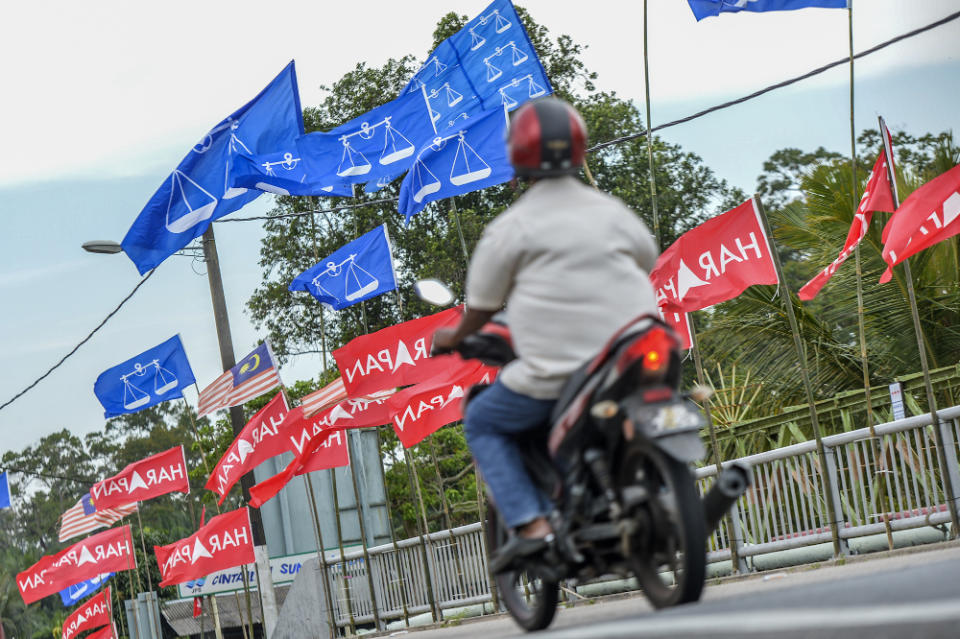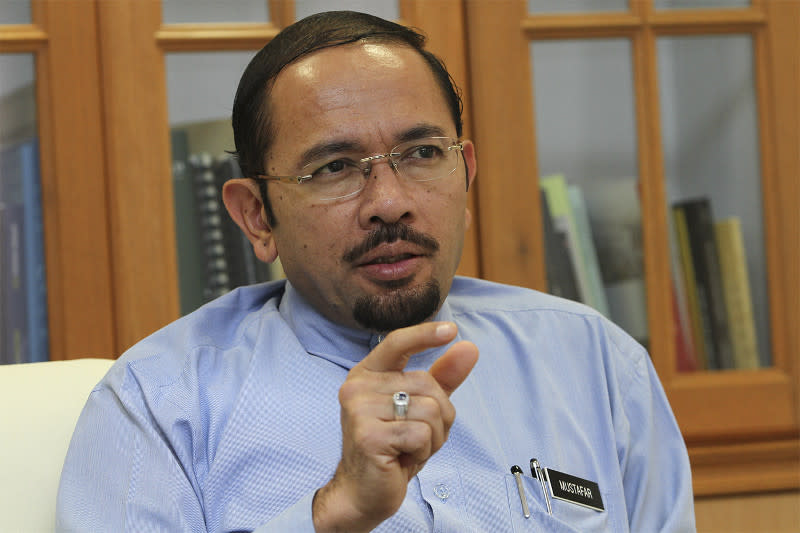Difficult to take action against politicians promising rewards during an election? EC chief explains why

KUALA LUMPUR, Nov 13 — The Tanjung Piai by-election is nearing its final lap, and with it, both Pakatan Harapan and Barisan Nasional have been locked in a fierce battle for votes.
With just three days left to the November 16 polling day, which would conclude the six-way battle for the seat, PH and BN have been thrust under the limelight, most notably for the number of election promises or goodies made to voters throughout the campaign period.
Many social media users had also scoffed and cried foul over the manner in which PH had “coincidentally” announced allocations for the hotly contested parliamentary seat, piling pressure on the Election Commission (EC) to act.
However, the task being demanded of the agency is not easy to execute, as such cases are too complex even for the EC, chairman Datuk Azhar Azizan Harun shares with the Malay Mail.
How so?
According to Azhar, it is difficult to out rightly label such election promises or money politics as an offence or otherwise, as there is no body of jurisprudence developed by the courts on the matter.
“In other words, there has been no court pronouncements on whether they constitute election offences.
“Under the Election Offences Act 1954, bribery; general bribery and corruption; doing certain action in order to influence voters to vote in a certain way or not to vote in a certain way, are election offences,” Azhar told Malay Mail when contacted.
“But the decision by the court regarding these offences has been far and few between. Only in the Cameron Highland case did the Election Court hold, that paying voters cash in the presence of a candidate is bribery/corruption.
“As to whether promises made or action done by a sitting government for the benefit of all voters in a constituency during campaign period constitute bribery/corrupt practice — nobody, and that includes me, knows!” he added.
Azhar lamented that the public and politicians as well as NGOs are usually under the wrong perception that such issues fall under the EC’s purview.
“Well, they are not. The EC organises and run elections. The proper authority in respect of enforcement of election offences is not the EC. They are the RMP and the MACC,” he said, using the acronym to refer to the Royal Malaysia Police and the Malaysian Anti-Corruption Commission.
He said that the EC however, does appoint Election Campaign Enforcement Officers (PPKPR), who have been announced in all the by-elections run by the EC.
Azhar said that the PPKPRs are usually made of police officers, local council officers, as well as representatives from political parties who are involved in the by-elections.
He added that the PPKPR also have a specific set of duties, and are only empowered to monitor several offences “that are clear and without doubt”, such as campaigning without permit, or putting up of illegal banners or posters.
“However, as to those activities which are not campaignings, or when those activities require serious legal interpretation, the PPKPR do not involve themselves in it,” he said, adding that the report by the said team are also uploaded on social media on a daily basis.
“They are very effective in preventing those campaign activities that come within their powers to monitor,” he said.
Azhar said that the PPKPRs, or anyone in the EC however, are free to lodge reports with the police and the MACC, if they have “personal knowledge” of any election offence constituting investigations from the police and the MACC.
“The PPKPR members have done so in the past,” he added.

PH and BN: Promises, promises
Azhar was asked to comment on Education Minister Maszlee Malik’s announcement of a RM3 million allocation to six schools in Tanjung Piai, to build open-air halls, the latest in the line of election goodies pledged by PH.
According to Bernama, Maszlee reportedly said that the construction of the said project is set to begin next month, and is expected to be completed by April next year.
The six schools are Sekolah Menengah Kebangsaan (SMK) Sri Kukup, Sekolah Kebangsaan (SK) Andek Mori Serkat, SK Batu 24 Pekan Nanas, SK Jeram Batu, SK Pengkalan Raja, and SK Parit Haji Adnan.
Maszlee also reportedly said that the late Tanjung Piai MP Datuk Md Farid Md Rafik had mooted the idea, to assist local schools and communities.
Previously, after his party came under fire for corruption allegations, Prime Minister Tun Dr Mahathir Mohamad said that the initial RM4 million allocated for Tanjung Piai is a mere coincidence, and not an attempt to fish for votes.
He explained that the government’s job is to budget for development projects and that Tanjung Piai was no different.
Dr Mahathir, who is also Parti Pribumi Malaysia Bersatu (PPBM) chairman affirmed Youth and Sports Minister Syed Saddiq Abdul Rahman assertion earlier that day, that the RM4 million allocation was not new and had been “discussed a long time ago.”
He told the press outside Dewan Rakyat that the allocation for sports infrastructure is part of RM14.6 million in funds that the late Dr Md Farid had requested for his constituency, prior to his death.
Last week, Lembah Pantai MP Fahmi Fadzil, lodged a police report against BN’s Tanjung Piai by-election candidate Datuk Seri Wee Jeck Seng, over an election pledge he made to send Muslims for umrah should he win the parliamentary seat.
Fahmi posted a photo of his police report on his Facebook page, urging police to investigate Wee, for what he termed as a bribe in return for votes.
Previously, Malaysiakini reported MCA’s Wee, to have reminded Tanjung Piai voters about his past programmes to send senior citizens for umrah in Mecca and promised to provide more such trips if he wins the by-election.
Wee made the statement during a ceramah in Pekan Nenas, where he assured that he will keep his promise, despite no longer having the type of resources he once had, when BN was in power.
Johor Mentri Besar Datuk Dr Sahruddin Jamal, had also announced a RM1,000 aid for 1,513 fishermen in the state’s southern region, to be dispersed beginning this week.
This again, coincided with the Tanjung Piai by-election.
However, when questioned over the move in Parliament, Agriculture and Agro-Based Industry Minister, Datuk Seri Salahuddin Ayub said he was authorised to deliver aid to fishermen at any time, even if this coincided with by-election campaigns.
He said it was his prerogative by virtue of his portfolio, which included caring for the welfare of fishermen.

Not just EC, MACC also faces an uphill task
Azhar’s laments, was also previously echoed by former MACC deputy commissioner in charge of prevention efforts, Datuk Mustafar Ali.
In a 2015 exclusive interview with Malay Mail, Mustafar said that it takes more than just claims of money being given to voters for the authorities to act on alleged perpetrators of money politics.
This he said, is especially if it is done during a national election.
He said the main issue is to establish a direct link between political parties or their leaders and the act of influencing the outcome of the national polls through the use of money.
Mustafar noted that the Federal Court had already set a precedent in 1981, when it ruled that it was not an offence when the-then Finance Minister Tengku Razaleigh Hamzah reportedly said during the Pengkalan Kota by-election that he would personally give money to improve the constituency if BN won.
The Federal Court ruled that the statement was in line with the responsibility of the government to ensure development and allocate funds regardless of whether there was an election.
Mustafar said the case was brought to the Anti-Corruption Agency (ACA) — the former iteration of the MACC — but was eventually disposed of by the courts as it became an issue of when the money was actually allocated by the government for the constituency.
The senior MACC official noted that it was a similar situation when now ex-prime minister Datuk Seri Najib Razak promised a RM5 million flood mitigation plan on the eve of the Sibu by-election in 2010 in Sarawak.
“Najib went to Sibu, he said, ‘ooh, in Sibu there used to be flood and if we win this candidate, he said he is going to give RM5 million’. But that amount has already been allocated in the government expenditure for the Malaysia Plan,” he said.
Related Articles Chin Tong: Let Tanjung Piai by-election be fresh start, time to strengthen Pakatan Dr M meets with Pakatan polling centre heads in conjunction with Tanjung Piai by-election Home Minister hopes cops will relax new permit ruling for walkabout campaigns


